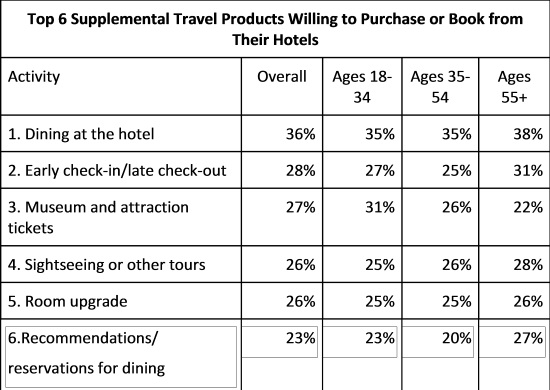
Are hotel brand dotcoms the new Amazon?
By cameron in Uncategorized
Here’s the great news for hoteliers: travelers love you more than you know.
NB This is a viewpoint by Kenneth Purcell, founder and CEO of iSeatz.
Recent research fielded by Phocuswright indicates that travelers want to book as much as possible through hotels: sightseeing tours, museum and event tickets, dining and other in-destination activities. This means your greatest competition – OTAs – haven’t won the battle for heart, mind and wallet.
Current research also shows that 18-34-year-olds prefer to see extra travel-related offers through Google.
Hoteliers can take a page from the Google playbook on this front, by realizing that what consumers want is to have their experiential dots connected for them when researching and booking travel. The preference to see travel ancillaries on Google is less about loyalty to Google than it is about being on Google for travel search and booking from the very beginning of an online session and wanting to be as efficient as possible.
Hotels can take heart knowing Google has no desire to go into the hotel business. Google does search extremely well and that’s what the company prefers to focus on. The fact that users can book hotels direct from the Google site allows hoteliers to win back some primary demand from OTAs.
The truth is that all travelers, no matter what age, want a painless travel shopping and booking experience. Whether it’s on Google, an OTA or your hotel website, they want to search, find and purchase as much of their trip as possible in as few clicks as possible.
For your hotel, this presents a couple of commercial opportunities.
Going beyond expectations with direct booking
Google and Amazon are gateways to finding and buying almost anything because they are singularly focused on smoothing experiential bumps for users. This is the reason it is so important for hotels wanting to grow direct bookings (along with share of mind and wallet) to offer ancillary travel products and services to round out the accommodation booking.
If hotels don’t do it, consumers will organically move to the supplier who does because it is simply more efficient.
Your hotel chain is not Google or Amazon; you’re more like a boutique known for curated inventory and excellent customer service. Your core hotel products – rooms, dining, events and other amenities – are essential to the travel experience. They are also only the beginning of the merchandising wonderland that can keep your site sticky and help you own the profitability OTAs or other suppliers would otherwise claim.
The ancillary opportunity
Among its many findings, our research found hotel guests are open to purchasing a very diverse range of alternative, externally provided, products and services from their hotel.
Some 47% of those surveyed find these offers helpful during the online booking process and 81% purchased a supplemental in-destination travel product on their last leisure trip.
Therefore, you need to make sure the most relevant offerings with the highest margins are baked into your hotel website and presented at the right times.

Additionally, 5% of millennials are willing to purchase child care in-destination.
As consumers are increasingly connected and empowered, user experience is a primary differentiator for hotels. And the technology is there for hotels to sell and monetize core hotel inventory along with third-party ancillary products and services, through beautiful, seamless and scalable digital experiences on any device.
NB1 This is a viewpoint by Kenneth Purcell, founder and CEO of iSeatz.
NB2: Image by BigStock
![]()

